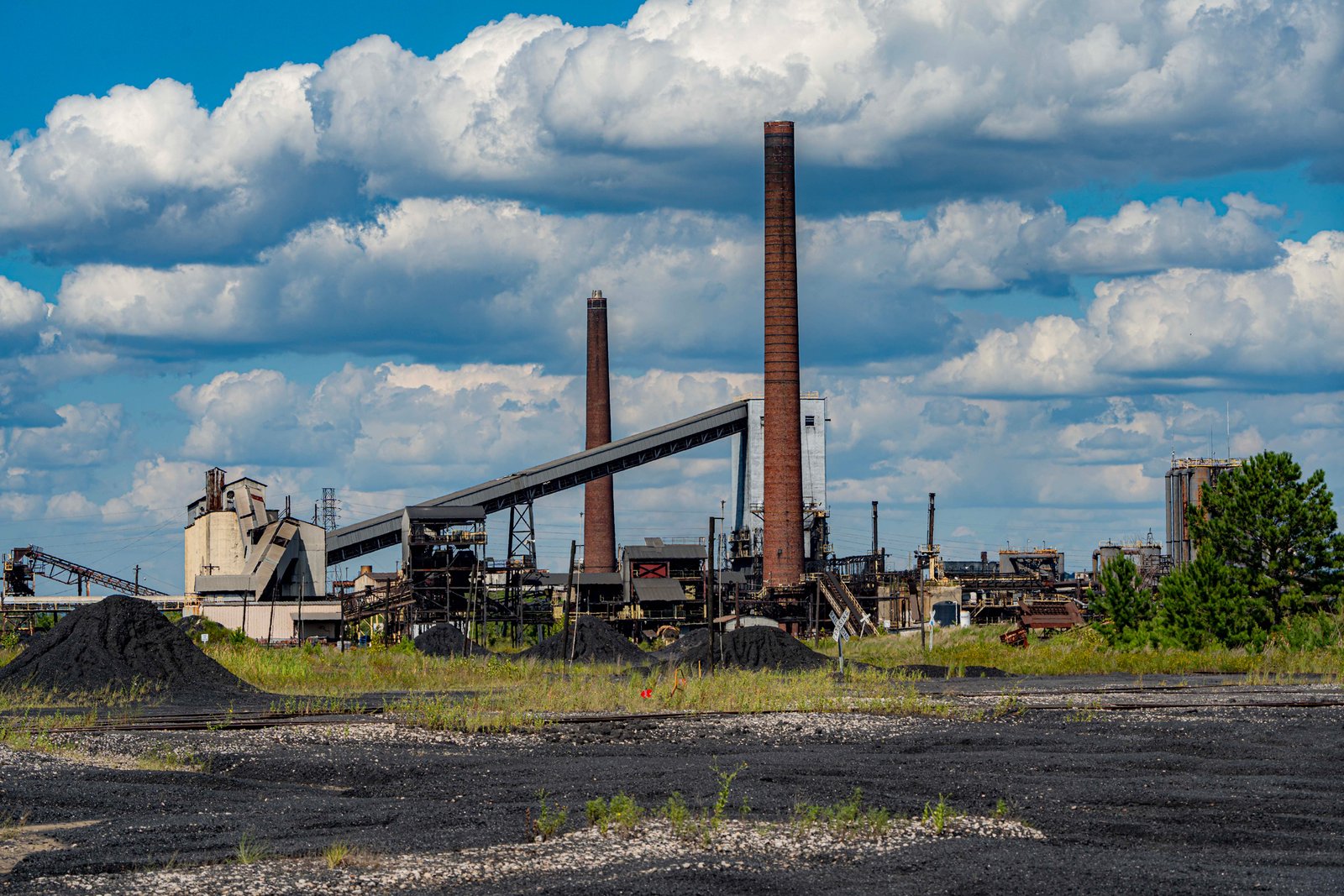Residents in majority-Black north Birmingham, Alabama, have long been subjected to industrial pollution. The new administration has cut funding for a program aimed at measuring the impact.
The language the Greater Birmingham Alliance to Stop Pollution (GASP) had used in its application to the Environmental Protection Agency had been clear. “We’re talking about helping a community,” Milton, GASP’s executive director, said last week, “where Black people have been disproportionately impacted.”
Black residents had breathed heavily polluted air from a nearby coke plant for decades, and their neighborhoods had been declared a federal hazardous waste Superfund site after it was determined that waste soil laced with arsenic, lead and benzo(a)pyrene, a human carcinogen, from several nearby coke plants had been spread around their homes as yard fill.
In light of this history and continued industrial pollution, GASP had obtained a $75,000 air monitoring grant from the Biden EPA in 2023.
Milton received the letter earlier this month from officials in President Donald Trump’s EPA terminating the grant because it no longer aligned with the agency’s priorities.
“I knew at some point they would notice the language of our grant,” Milton said, in that it made reference to services intended to help Black people.
Still, she said she doesn’t regret the way GASP characterized the situation on the ground in north Birmingham—that the need for air monitoring stemmed from the city’s history of corporate exploitation of majority-Black workers and residents.
Growing up in Birmingham, Milton said her grandparents often discussed the legacy of workers in the Magic City—so-nicknamed because of the seemingly supernatural economic boom spurred by steel production following the end of the Civil War.
“The majority of these workers were Black, and we can see the disparate impact that still has today,” Milton said. “And it’s really important for Birmingham to talk about our legacy and our history.”
Sanitizing that history, then, to comply with the Trump administration’s stated opposition to all things DEI and environmental justice—as if they were the same thing, just because they both often involve Black people—doesn’t sit well with her.
“I think the narrative work is gone then,” Milton said. “And we have to think about history so we don’t live it again.”
The grant, awarded through EPA’s small grants program, was set to fund GASP’s efforts to train residents in using air monitoring equipment to help establish a community air monitoring program, allowing those in north Birmingham access to critical information about the pollutants filling their lungs every day.
In addition to what is now the 35th Avenue Superfund site, encompassing the neighborhoods of Collegeville, Harriman Park and Fairmont, north Birmingham remains home to several polluters, leaving its residents in the 90th percentile for particulate matter, according to EJ Screen, a government tool also recently shuttered by the Trump administration.
That context of present and past pollution was what made securing funds for air monitoring so important, Milton said, giving residents an opportunity to learn more about the continued impact of industry on their health.
“For decades, residents of North Birmingham and other historically marginalized communities have been forced to live in the shadow of toxic industries with little support or transparency,” Milton wrote in a statement after receiving the termination letter. “The grant made it possible for us to monitor and document the pollution people live with everyday. Revoking this support sends a message that the health of Black, Brown, and low-income communities in Alabama is disposable.”
In its letter, EPA officials said the agency no longer supported the grant’s objectives.
“The purpose of this communication is to notify you that the U.S. Environmental Protection Agency (EPA) is hereby terminating Assistance Agreement No. EQ-02D22522 awarded to GASP,” the letter said. “This EPA Assistance Agreement is terminated in its entirety effective immediately on the grounds that the award no longer effectuates the program goals or agency priorities. The objectives of the award are no longer consistent with EPA funding priorities.”

GASP’s isn’t the only environmental justice effort in Alabama nixed by federal officials. In April, Trump announced the termination of what the administration termed an “illegal DEI” settlement aimed at addressing sewage issues in the state’s black belt that have left its majority-Black residents sometimes unable to flush their own toilets.
The agreement, reached under the Biden Administration, required the state’s Department of Public Health to improve sanitation efforts in the region. It’s still unclear what that termination will ultimately mean on the ground.
In the end, Milton said the impact of the administration’s decision to terminate the north Birmingham air monitoring grant is racist.
“Look at the way they talk about environmental justice,” she said of administration officials. “They say it’s illegal to address these issues. So you hear the things they say, and it’s reasonable to discern from that that the impact is racist, and that what they’re doing is intentional.”
People of all races are forced to face the consequences of polluted air and water, Milton emphasized, but ignoring the reality that people of color have borne and continue to bear the brunt of industrial exploitation isn’t helpful. In fact, she explained, doing so could undermine the relationship organizations like hers have built with residents of color living through the impacts of pollution every single day.
“I don’t want to sacrifice the trust we have in communities that want to be heard because they notice that we start to change the way we talk about these issues,” she said. “Because they are the most important stakeholders. They’re who we’re here to serve.”
Moving forward, GASP plans to appeal the termination with EPA officials, Milton said, though she suspects the agency is unlikely to change its mind. If that’s the case, the nonprofit will do what they’ve always done—look to individual donors to fill in the gaps. It’s work that can’t be abandoned, Milton said. Not if she can help it.
About This Story
Perhaps you noticed: This story, like all the news we publish, is free to read. That’s because Inside Climate News is a 501c3 nonprofit organization. We do not charge a subscription fee, lock our news behind a paywall, or clutter our website with ads. We make our news on climate and the environment freely available to you and anyone who wants it.
That’s not all. We also share our news for free with scores of other media organizations around the country. Many of them can’t afford to do environmental journalism of their own. We’ve built bureaus from coast to coast to report local stories, collaborate with local newsrooms and co-publish articles so that this vital work is shared as widely as possible.
Two of us launched ICN in 2007. Six years later we earned a Pulitzer Prize for National Reporting, and now we run the oldest and largest dedicated climate newsroom in the nation. We tell the story in all its complexity. We hold polluters accountable. We expose environmental injustice. We debunk misinformation. We scrutinize solutions and inspire action.
Donations from readers like you fund every aspect of what we do. If you don’t already, will you support our ongoing work, our reporting on the biggest crisis facing our planet, and help us reach even more readers in more places?
Reporter, Alabama
Lee Hedgepeth is Inside Climate News’ Alabama reporter. Raised in Grand Bay, Alabama, a small town on the Gulf Coast, Lee holds master’s degrees in community journalism and political development from the University of Alabama and Tulane University. Lee is the founder of Tread, a newsletter of Southern journalism, and has also worked for news outlets across Alabama, including CBS 42, Alabama Political Reporter and the Anniston Star. His reporting has focused on issues impacting members of marginalized groups, including homelessness, poverty, and the death penalty. His award-winning journalism has appeared in publications across the country and has been cited by the New York Times, the Wall Street Journal and the Washington Post, among others.










